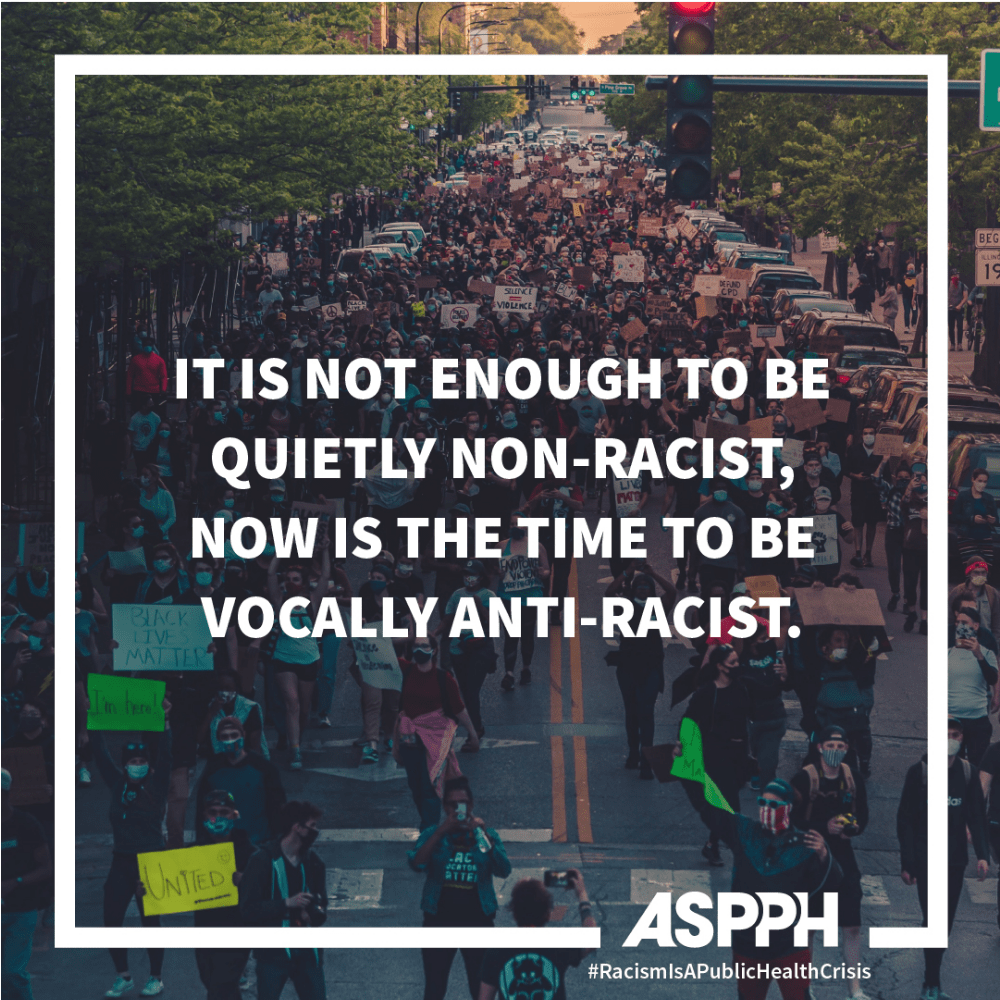Diversity, Equity, & Inclusion

Racism and Discrimination Are Public Health Crises
Our University, College, and Program have made it clear: we cannot and will not tolerate racism or discrimination in any form. It is our responsibility to make our own voices heard. To advance the health and wellbeing of us all, we must work tirelessly to identify and confront racism, on personal, institutional, and structural levels. To all those suffering, and all those seeking justice, we stand with you in solidarity. We are committed to having anti-racism and anti-discrimination be enduring components of the curriculum, research, and engaged activities of our Program. We are committed to exercising the power represented in the faculty, staff, and students of our Program to undo racism wherever we can, and we will not waver in this effort.
Our Curriculum
The MPH Program curriculum is designed around the central tenets of sustainability, equity and engagement. Sustainability itself has issues of equity and cultural competency at its core: environmental sustainability can be thought of as equity across generations, and environmental issues such as climate change and loss of locally-obtained food resources typically affect disadvantaged communities (and countries) disproportionately. The curriculum offers tools and dialogue to students to raise awareness and agency around diversity, equity and inclusion issues throughout the course of study, helping to maintain a culturally competent learning environment and to advance a culturally competent public health workforce.

Equity: A Pillar of Public Health
Equity has been a pillar of our program since its inception. The health and wellbeing of one population should not come at the expense of another, whether now or in the future. Our first goal is to advance equity through public health. To achieve this goal, we have outlined objectives and evaluation measures to recruit and support a diverse student body; recruit and support a diverse team of faculty and staff; promote awareness of issues related to inequity, exclusion, and racism; help dismantle structural racism within and outside our community; and, promote equity and inclusion through teaching, research, and service. Although we have made progress toward each of these aims, we can and will do more to fight injustice.
Strategies
- Recruiting: Define, monitor and reevaluate recruiting efforts each year, to identify those that promote diverse applicant pools.
- Scholarships: Dedicate at least 10% of possible tuition revenue each year as tuition assistance.
- Reducing barriers: No longer require the Graduate Record Examination (GRE) for admissions.
- Curriculum: Deliver a curriculum that offers tools and dialogue to all students to raise awareness and agency around diversity, equity and inclusion issues.
- Feedback: Provide judgment-free opportunities for students, faculty and staff to provide feedback, both anonymously and in open fora such as Program “town hall” meetings.
- Response: Respond as a Program to feedback, with transparent action and communication.
- Continuing education: Offer and encourage training and workshops for faculty and staff to raise awareness of and dialogue around diversity, equity and inclusion issues, including cultural competence, internationalizing the curriculum, and facilitating health equity discussions.
- Student engagement: Engage students as key stakeholders to shaping, implementing, and evaluating Program culture, curriculum, research, community engagement, and continuing education and events.
Our Students
%
Priority Populations*
%
First Generation
%
International
*Priority populations
*Priority populations: The MPH Program defines priority populations as U.S. students representing underserved populations, as well as those who are underrepresented in the public health workforce and education. The Program’s priority populations have been defined based on numerous conversations with stakeholders, knowledge of the social determinants of health, knowledge of the composition and needs of the public health workforce, and knowledge of underserved populations in central NY, the United States, and communities around the world. Cornell’s MPH Program thus places special focus for outreach, recruitment, and support for students, on the following underserved and/or underrepresented priority populations, to increase Program diversity and promote equity in the field of public health:
- Rural upstate New York residents, representative of underserved local communities, and to further Cornell’s land-grant mission to “advance the lives and livelihoods of the state’s citizens”
- Racial and ethnic populations underserved by and underrepresented in many U.S. health systems (including but not limited to Black Americans, Native American and Hispanic/Latino/a populations and other marginalized and historically excluded groups, in the public health workforce)
- Persons from lower-income or economically disadvantaged households or backgrounds
- First-generation college students
- Military veterans
- Single parents
- Persons with disabilities
- Persons who self-identify as LGBTQIA+

Antiracism, Antidiscrimination, Diversity, Equity, and Inclusion
Our Program is committed to continually reviewing and revising our curricula, improving the accessibility of our program to people of color and any people who face discrimination, partnering with organizations that work toward antiracism and antidiscrimination, and promoting an environment of diversity and inclusion. Toward this aim and a commitment to meaningful, lasting, and sustainable change, our faculty, staff, and students have organized around Antiracism, Antidiscrimination, Diversity, Equity, and Inclusion (ARADDEI), with four areas of focus.
Focus Areas
- Programmatic: review, evaluate, and advance aspects of the MPH Program including policies, culture, and strategies.
- Curriculum: infuse anti-racism, anti-discrimination and equity instruction throughout the curriculum and have students broadly consider equity in every public health topic they encounter.
- Engagement & Research: foster engaged partnerships, student support, and research and evaluation projects focusing on anti-racism, equity, and public health impacts.
- Continuing Education & Events: facilitate dialogue among faculty, staff, and students, and between our Program and outside partners, to build awareness and tools for addressing structural racism in public health and in our communities.
Anonymous Reporting For Students
You should contact the Office of Institutional Equity and Title IX if you have any questions or concerns regarding discrimination or harassment of any kind. If you are an MPH student and would like to provide feedback on an issue concerning diversity, equity, and inclusion, you can also complete an anonymous form in Canvas by clicking the button below.
